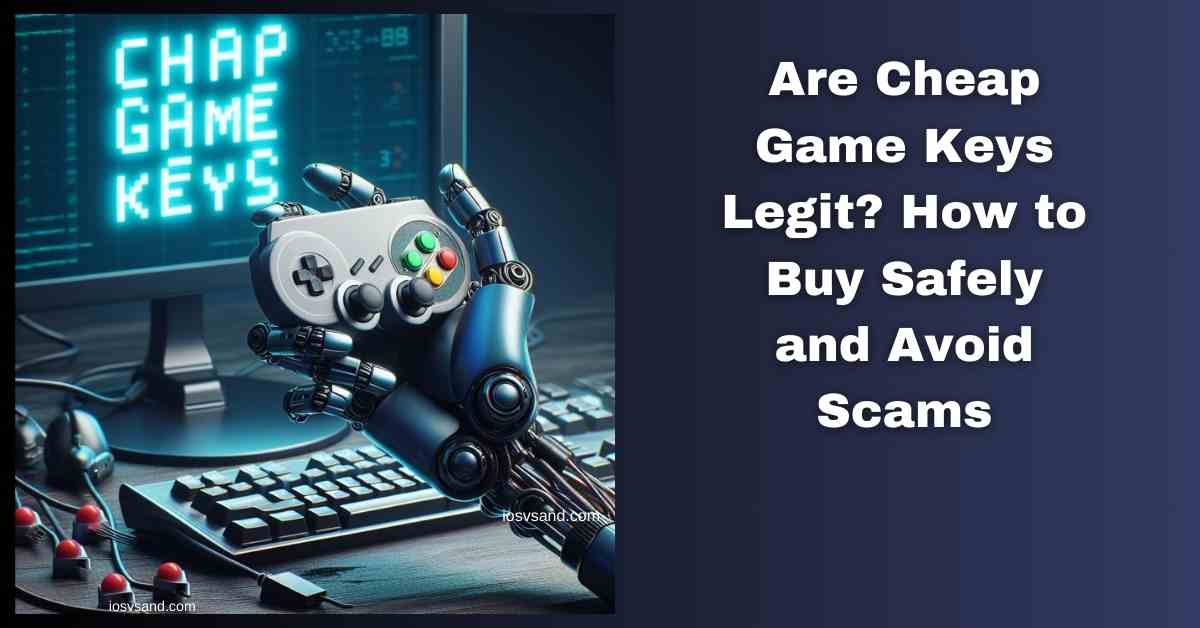Let's be brutally honest: most so-called "smart" home tech is dumber than a bag of…

Broke Gamer’s Paradise: How to Buy Cheap Game Keys Safely
Thinking to buy cheap game keys on Kinguin? –> Run this threat analysis FIRST.
WHAT IT IS: Kinguin connects YOU (the buyer) with loads of different sellers hawking digital keys, often way cheaper than official stores. Big selection? CHECK. Low prices? OFTEN. That’s the hook.
WHY YOU SHOULD CARE (The Catch): It’s a marketplace, not a direct store. Kinguin doesn’t own the keys. –> THIRD-PARTY SELLERS do. This means HUGE variation. Some sellers are legit; others… not so much. RISK is the name of the game here. Think dodgy keys, seller ghosts, and support that might make you wanna rage-quit life.
THE NEIGHBORHOOD (Competitors): Kinguin chills in the “grey market” zone with G2A, CDKeys, and Eneba. They all promise cheap keys but come with similar warnings. Contrast this with places like GameBoost, aiming for squeaky-clean legitimacy (usually at a slightly higher cost).
2024-2025 INTEL: Kinguin = MIXED BAG.
- GOOD FOR: Bargain hunters and seekers of rare/old digital treasures. People who are willing to gamble a bit for savings.
- BAD FOR: Anyone demanding GUARANTEED legit keys, solid customer support, or ethically squeaky-clean sources. If that’s you, tread VERY carefully. <– REAL TALK. Research sellers LIKE A HAWK. Understand their buyer protection (or lack thereof) and accept the inherent risks of the grey market hustle.
- What actually is Kinguin? Cracking the Code
- How Kinguin Works: Lifting the Hood
- Benefits of Using Kinguin: The Shiny Side
- Drawbacks and Concerns Regarding Kinguin: The Dark Side
- Pros and Cons of Kinguin: The Scorecard
- Kinguin vs. Competitors: The Showdown
- Who Should Use It and Who Should Not: The Verdict
- Precautions to Follow Before Buying from Kinguin: Your Pre-Flight Checklist
- Tips and Tricks for Using Kinguin: Level Up Your Shopping Game
- Conclusion: The Final Boss – Should You Use Kinguin?
- FAQs
What actually is Kinguin? Cracking the Code
Definition and Core Offerings: The Digital Flea Market
Okay, imagine a massive online swap meet. That’s Kinguin. It’s an e-commerce marketplace where regular folks and businesses buy and sell digital keys. Primarily? Video games. TONS of ’em. But also software licenses (like Windows or Office) and even in-game stuff (think [[CS2]] skins).
It works peer-to-peer (the seller connects directly to the buyer). Kinguin just provides the space and takes a cut. They boast OVER 50,000 different games and digital products. HUGE catalog. BIG MOVE (July 2024): Launched a dedicated digital software marketplace. –> Pushing cheap Windows 11 Pro OEM keys hard. They are trying to look legit (“affordability and authenticity,” they say…) while expanding their turf. Mirrors their game plan. Address the BIGGEST FEAR: key validity. We’ll see how that pans out.
Establishment and Growth Timeline: The Origin Story
Launched? Officially, January 2013. Growth? EXPLOSIVE. Hit 17 MILLION registered accounts by Nov 2023. Claimed over 10 MILLION global users. Generated over MILLIONS in sales since launch. <– BIG NUMBERS.
Heads Up: There’s conflicting data. CB Insights says Kinguin started in 2009. Weird. Something to watch. –> Data discrepancy noted.
Target Audience and Global Reach: Who Buys This Stuff?
Mainly GAMERS who hunt for DISCOUNTS. If you flinch at full price on Steam or the PlayStation Store, Kinguin’s prices look REALLY tempting. Budget-conscious folks, this is your siren song.
Their reach is GLOBAL – operating in 100+ countries. They have localized sites to make it easier for people everywhere. Clear strategy: target markets where price is KING.
How Kinguin Works: Lifting the Hood
Marketplace Model: The Middleman Gig
Think of Kinguin as the landlord of this digital bazaar. They don’t own the stalls (the keys); they just rent space to third-party sellers (individuals, businesses) and connect them with buyers.
- How Kinguin Gets Paid: Takes a commission (usually 5-10%) from every sale. More sales = more cash for Kinguin.
- The Trade-Off: Sellers list stuff based on price, ratings, and descriptions. BUT Kinguin DOES NOT directly control key quality or origin. <– THIS IS THE CORE RISK. Lots of negative reviews scream about bad keys and sketchy sellers because of this hands-off approach.
Process for Buying Digital Products: The Click-and-Pray Method
Buying is straightforward, like most online stores:
- Browse/Search: Use the search bar or filters (price, popularity, SELLER RATING <– PAY ATTENTION TO THIS).
- Seller Ratings: Each listing shows the seller’s rep based on past deals. USE THIS. It’s your main clue about reliability.
- Checkout: Standard (create/login account) or Guest option.
- Payment: Various methods are accepted (see below).
- Receive Key: Usually INSTANT delivery via email/account.
Crucial Point: Seller ratings are heavily pushed, aiming for community trust. But the sheer volume of scam reports suggests ratings AREN’T FOOLPROOF. Buyer beware, ALWAYS.
Payment Methods and Transaction Security: Handing Over Your Digital Cash
- Accepted: Major Credit Cards, PayPal, Bitcoin (cryptocurrency). They also have Kinguin Coins (their own virtual cash).
- Perk: Using Kinguin Balance (likely tied to Coins) might skip extra payment processing fees.
- Security: Standard stuff – SSL encryption (the padlock icon tech), secure payment gateways. They added KYC (Know Your Customer) verification with Shufti Pro in late 2022 to fight fraud by verifying identities during purchases. <– Good step, BUT…
- Reality Check: Reports of fraud and bad charges still pop up. Security is a constant battle, and maybe not always won here. –> Persistent negative feedback despite security measures noted.
Seller Registration and Verification: Who Are These Sellers Anyway?
Anyone (individuals, businesses) can try to sell. They need an account and verification. Kinguin claims they vet sellers by checking documents, company history, and user reviews.
- Individuals: Might need an ID scan.
- Businesses: Might need proof of address, registration, tax info, etc.
THE REALITY CHECK: –> Sounds good on paper. –> BUT –> Constant reports of SCAMS, USED KEYS, and INVALID KEYS make you wonder how rigorous this really is. [FLAG: Verification process described, but effectiveness doubted based on widespread user issues]
- “Seller Protection”: A PAID service for sellers against fraud losses. –> Kinda admits the platform has fraud issues they expect sellers to pay to mitigate! Interesting.
Kinguin Coins: Platform Funny Money
It’s their own virtual currency. Use it via “Kinguin Balance” to buy stuff, potentially avoiding extra fees. Strategy? Keep users locked into their ecosystem, encourage repeat business, and maybe manage transaction costs better internally.
How Kinguin Works (Practical Guide) <– Let’s Break It Down SIMPLY
Think of Kinguin as a giant digital key vending machine, but behind each slot is a different person stocking it. Some are meticulous, some are… less so.
Creating an Account: The Entry Fee (Free!)
- Hit up Kinguin’s site. Find “Sign in” (usually at the top right).
- Standard signup: Email, password, etc. You know the dance.
- Need-to-Know: Browse is free; buying requires an account.
Searching for Games: The Treasure Map
- Search bar = basic. Filters = POWER. Use ’em:
- Platform: PC main stage, but filter for [[Xbox]], [[PlayStation]], [[Nintendo]], [[Steam]], [[Epic Games]], etc.
- Genre: RPG nut? FPS fiend? Filter it down.
- Budget: Set your max price. No heartbreak allowed.
- SAFETY NET: Seller Ratings ARE CRITICAL. Aim HIGH (95%+). Seriously.
The Purchase Process: Locking It Down
- Found your prize? –> DOUBLE-CHECK THE SELLER RATING. Paranoia is healthy here.
- Multiple sellers for the same game? –> Compare prices. Hunt that bargain.
- “Add to Cart.” You’ve done this before. Easy peasy.
- Payment: PayPal, credit card, and others (check their current list).
- Click BUY. –> CHECK YOUR EMAIL. Your game key should arrive FAST. Almost instant.
Activating Your Key: Unleash the Game!
That string of letters/numbers? That’s your key. Time to unlock the game:
- Steam User? In the Steam client: Games Menu –> “Activate a Product on Steam…” Paste key. Done.
- Origin User? Origin client: “Redeem Product Code.” Similar deal.
- Console Warrior? PS Store, Xbox Marketplace, Nintendo eShop –> Find the “Redeem Code” section.
- Pro Tip: Kinguin might give instructions. If not? Google “[Game Name] activate key [Platform Name].” Problem solved 99% of the time.
Benefits of Using Kinguin: The Shiny Side
Price Competitiveness and Potential Cost Savings: CHEAP. KEYS.
This is the MAIN DRAW. <– That’s why most people show up. Prices are often SIGNIFICANTLY LOWER than official stores (Steam, Microsoft Store, etc.). Why? Marketplace competition! Sellers undercut each other.
- They’ve been called the best value for some popular games.
- Their 2024 push for cheap Windows 11 Pro OEM Keys highlights this focus.
- REMEMBER: Cheap comes with RISK. It’s a trade-off. ALWAYS.
Vast Selection of Digital Products: The Endless Aisle
HUGE CATALOG –> Over 50,000+ items.
- Latest AAA monsters? Check.
- Weird indie gems? Check.
- OLD, RARE, or discontinued games/software you can’t find elsewhere? BIG check. This is a key niche.
- Software (Windows, Office), region-specific versions… it’s packed.
- Why so big? –> Tons of sellers from all over the globe listing their stuff.
User-Friendly Platform Interface: Easy on the Eyes
Generally, people find the site easy to use.
- Intuitive design, simple navigation.
- Clear menus and filters help sift through the chaos.
- Making it easy to browse and buy is crucial for keeping users around, especially with the underlying risks.
Buyer Protection Program: The Safety Net (Maybe?)
Kinguin offers Buyer Protection. Supposedly, it guarantees a refund or replacement if your key is bunk (invalid, used).
- It uses an escrow system (holds payment until you confirm activation… sometimes).
- Some users see this as a trust booster.
- CAVEAT: Sources suggest it might be an OPTIONAL ADD-ON –> COSTS EXTRA. And its effectiveness gets mixed reviews. So, it’s there, but don’t assume it’s automatic or foolproof. –> Effectiveness and the potential cost of Buyer Protection are noted as a variable.
Drawbacks and Concerns Regarding Kinguin: The Dark Side
Risks Associated with Third-Party Sellers: Welcome to the Wild West
This is the BIGGEST HEADACHE. <– Where most problems start. You’re buying from randoms.
- FRAUD POTENTIAL: Sketchy sellers pushing bad keys (fake, invalid, already used). That’s the nightmare scenario.
- LEGITIMACY QUESTIONS: Where did these keys come from? Stolen credit cards? Bulk purchases meant for cheaper regions? Often unclear. Devs sometimes hate these sites for this reason.
- USED / ALREADY REDEEMED KEYS: Super common complaint in 2024-2025 reviews. You pay, the key doesn’t work. Ouch.
- REGION-LOCKED KEYS: Buying a key you can’t even use in your country. Double ouch.
- The Core Problem: Kinguin’s hands-off model makes it hard to guarantee EVERY key from EVERY seller is legit. Scams HAPPEN.
Customer Support Experiences and Reported Issues: The Support Black Hole?
Getting help can be… rough. MAJOR source of complaints.
- SLOW Response Times: Waiting ages for help while your game gathers digital dust.
- DIFFICULT Resolutions: Getting bounced around, asking for tons of proof, still getting nowhere.
- Unhelpful / “Moronic” Responses: Some 2024-2025 reports mention support agents who weren’t exactly helpful.
- BLAME GAME: Users feel Kinguin sometimes ducks responsibility, pushing disputes back onto the buyer/seller.
- Bottom Line: In a market prone to issues, BAD support makes everything WORSE. This is a CRITICAL failure point for many users.
Potential Hidden Fees or Unexpected Charges: The Price Isn’t Always the Price
Those sweet, low prices? Watch out at checkout.
- Users report HIDDEN SERVICE CHARGES popping up, sometimes jacking the price up significantly (reports of up to 50%!).
- The lack of upfront transparency feels sneaky and kills the “good deal” vibe fast. Erodes trust.
Concerns About the Legitimacy of Key Sources: The Ethical Swamp
Where do cheap keys COME FROM? That’s the million-dollar question.
- Developer Backlash: Some game devs literally say PIRACY is better than buying from grey markets like Kinguin. Why? They suspect keys are bought with stolen credit cards or other shady means. The dev gets hit with chargebacks; they make $0 or lose money.
- REVOKED KEYS: Publishers CAN and DO cancel keys bought illegitimately. You buy a key, play for a week, then POOF –> game access GONE.
- BANNED ACCOUNTS: Using dodgy keys can risk your entire Steam/Xbox/PSN account. HIGH STAKES.
- The Grey Market Problem: It’s ethically murky and carries REAL risks for buyers.
Other Drawbacks: The Little Annoyances (That Add Up)
- Refund Hassles: Getting money back can be complicated or just… fail.
- Crypto Payment Issues: Problems reported when trying to pay with crypto.
- Unauthorized Charges: SCARY. Some users claim extra charges hit their accounts after buying.
- Selling ACCOUNTS, Not Keys: Sneaky sellers might list an entire game account (often against platform ToS), hiding the details. Sometimes, these accounts are already banned!
- Lack of Transparency: Important details (conditions, limits) are hidden in descriptions.
- Pre-Order Delays: Keys might not arrive on release day. Depends on the seller.
Pros and Cons of Kinguin: The Scorecard
| Pros | Cons |
| Competitive pricing (Potential $$$ Savings) | HIGH RISK of invalid/used/region-locked keys from 3rd parties |
| WIDE selection (Games, Software, Rare Stuff) | Inconsistent / Often BAD Customer Support |
| User-friendly platform interface | Potential HIDDEN FEES / Unexpected Charges |
| Buyer Protection program OFFERED | Ethical concerns (Grey Market key sources) |
| Availability of Kinguin Coins | RISK of game keys being REVOKED or accounts BANNED |
| Complicated / Unsuccessful refund process for some |
Kinguin vs. Competitors: The Showdown
Comparative Analysis: The Grey Market Gang
- Kinguin vs. G2A: Often seen as TWINS in the grey market. Similar models (marketplace), similar primary benefits (low prices), similar major risks (dodgy keys, iffy support). Devs often dislike both equally. Trustpilot scores fluctuate for both. –> They are the big two in this space.
- CDKeys: Another big name. Operates more as a direct reseller (they buy and sell) vs. a pure marketplace (connecting others). Sometimes seen as a slightly more reliable BUT still grey market. Key sources are often unclear. Known for VERY cheap deals.
- Eneba: Rising Star works much like Kinguin/G2A (marketplace). Competitive prices, wide selection. User experiences are mixed, just like the others. It shows that the strong demand for cheap keys persists despite risks. Competition might push Kinguin to improve… maybe.
- GameBoost: Positions itself as the legit alternative. Focuses on authentic keys and good customer service (24/7 chat, loyalty program). It likely costs a bit more. Target users who prioritize safety over rock-bottom prices. Highlights Kinguin’s weakness for risk-averse buyers.
- Other Players: Web traffic suggests allkeyshop (a price comparison site often leading to these stores), cdkeys, and eneba are Kinguin’s closest rivals. Other names thrown around: Driffle, Robot Cache, Itch, GAMIVO, Instant Gaming, Fanatical, Humble Bundle (often partners with devs), GOG (DRM-free focus), Green Man Gaming (official partnerships). LOTS of options.
Table: Kinguin vs. Key Competitors
| Feature | Kinguin | G2A | CDKeys | Eneba | GameBoost |
| Model | Marketplace | Marketplace | Grey Market Reseller | Marketplace | Direct Retailer / Platform |
| Trustpilot | ~3.2-4.6 (Varies WILDLY) | ~3.2-3.8 (Varies WILDLY) | ~4.8 (Generally High) | ~4.3 (Good) | ~4.4 (Good) |
| Key Source | 3rd Party (Grey) | 3rd Party (Grey) | Unclear (Grey) | 3rd Party (Grey) | Verified Distributors (Legit) |
| Support | Often Criticized | Often Criticized | Generally Better | Mixed Reports | Praised (24/7 Chat) |
| Key Risks | HIGH (Invalid/Used/etc.) | HIGH (Invalid/Used/etc.) | Lower, but still Present | Moderate | LOW (Authenticity Focus) |
| Price | Competitive | Competitive | Often VERY Competitive | Competitive | Competitive (often w/ price guarantee) |
| Noteworthy | Wide Selection, Kinguin Coins | Large Market, G2A Shield (Paid) | Cheap Deals, Direct Resell Model | Growing Platform | Authenticity Focus, Strong Support |
Who Should Use It and Who Should Not: The Verdict
Who SHOULD Use Kinguin:
- PRICE-SENSITIVE Gamers: If the cost is your #1 driver, then you accept the gamble.
- RARE Game Hunters: Seeking old, delisted, or region-specific stuff unavailable elsewhere.
- SAVVY Shoppers: Willing to DEEPLY research sellers, use buyer protection (if applicable), and troubleshoot potential issues.
- Grey Market Veterans: They already understand the risks and know how to navigate these platforms. Tech-comfortable users prepared for potential problems.
Who SHOULD NOT Use Kinguin:
- Safety-First Buyers: Anyone who needs GUARANTEED authentic, working keys. Period.
- Support Seekers: If reliable, fast customer service is important to you. Kinguin’s track record here is SPOTTY AT BEST.
- Ethical Consumers: Uncomfortable with grey market sourcing (potential stolen keys, etc.).
- Need-It-Now Users: Anyone needing immediate, guaranteed access without potential hassle (e.g., for work software, critical use). Stick to official channels.
- Risk-Averse Individuals: If the thought of losing money on a bad key or dealing with disputes stresses you out, stay away. Peace of mind has value.
Precautions to Follow Before Buying from Kinguin: Your Pre-Flight Checklist
Seriously, don’t skip this. It’s your armor.
CHECK SELLER RATINGS & REVIEWS: ABSOLUTELY CRITICAL.
- Look for a HIGH positive % (95%+) AND a HIGH number of reviews. Lots of good feedback over time is better than a perfect score from 10 sales.
- Read recent negative reviews – what are people complaining about?
- Be wary of new sellers with few ratings.
- Remember: Ratings can be gamed. Use them as one tool, not the only one.
VERIFY Product Details (Region/Platform/Edition): READ THE FINE PRINT.
- REGION LOCKS: Is the key for YOUR country? It’s a HUGE issue if missed.
- PLATFORM: Is it Steam? Xbox? Epic? Make SURE it matches where you play.
- EDITION: Standard? Deluxe? GOTY? Ensure it’s the version you want.
- Don’t rely on images alone. READ the title and description FULLY. Contact the seller if unsure BEFORE buying.
UTILIZE Buyer Protection & Secure Payments: Layer up your defense.
- Consider Kinguin’s Buyer Protection IF offered (know it might cost extra and have limits).
- USE PAYPAL if possible. Their own dispute resolution adds another safety net.
- Avoid direct credit card entry if redirected off-site (shouldn’t happen often, but be alert).
INVESTIGATE Before Purchasing: Do your homework off-site.
- Google the game key + Kinguin + seller name. See if others report issues.
- Search forums (Reddit’s r/GameDealsMeta, etc.) for seller reputation.
- “Too good to be true” prices? Often ARE. EXTREME discounts can signal stolen/dodgy keys. Be skeptical.
OTHER PRECAUTIONS: More things to watch…
- AVOID BUYING ACCOUNTS: VERY high risk. It could be stolen, recovered by the original owner, or banned. Just buy KEYS.
- PRE-ORDERS = POTENTIAL DELAYS: Don’t expect keys exactly at midnight release. Sellers need to get them first.
- KEEP RECORDS: Screenshot listings, save order confirmations, and transaction IDs. You’ll need proof if things go wrong.
Tips and Tricks for Using Kinguin: Level Up Your Shopping Game
Finding Best Deals & Reliable Sellers:
- COMPARE PRICES: Same game, multiple sellers? Check ’em all.
- PRIORITIZE HIGH-RATED, EXPERIENCED SELLERS: Yes, I’m repeating this. IT’S THAT IMPORTANT. 95%+ positive, thousands of sales = SAFER.
- SORT & FILTER: Use platform tools –> Sort by price (low to high) and sort by seller rating (high to low).
- PROMO CODES / SALES: Look for site-wide or seller-specific discounts.
- PRICE COMPARISON SITES: Use Allkeyshop, etc., to compare Kinguin’s price against competitors before buying.
- PRICE ALERTS: Some tools let you track prices and get notified of drops.
Utilizing Kinguin’s Features (Know Your Tools):
- UNDERSTAND BUYER PROTECTION: Read the terms. Know HOW to file a claim before you need to.
- KINGUIN BALANCE / COINS: If you buy often, using this might save on payment fees. Weigh the benefit vs. locking funds on the platform.
- USE FILTERS EFFECTIVELY: Don’t wade through junk. Filter by platform, region, price, and seller rating.
- KNOW THE DISPUTE PROCESS: Understand how to use the Resolution Center if a key is bad. Know escalation steps.
Staying Informed & Mitigating Risks:
- STAY UPDATED: Follow gaming news and forums (Reddit). Know the latest scams or warnings about grey markets.
- REPORT ISSUES PROMPTLY: Use the Resolution Center ASAP if a key is bad.
- VPN for Region Locks? USE EXTREME CAUTION. Bypassing region locks can violate ToS for Kinguin AND the game platform (Steam, etc.). Risk account bans. Think carefully.
- DON’T HOARD KINGUIN BALANCE: Keep minimal funds there. Reduces loss if your account gets compromised.
Conclusion: The Final Boss – Should You Use Kinguin?
Look, here’s the STRAIGHT_DOPE on Kinguin as of 2024-2025: It’s still a MAJOR player in the digital key marketplace game. –> Its core appeal remains unchanged: LOW PRICES and a MASSIVE SELECTION. The marketplace model fuels competition, driving costs down and making rare stuff available. <– That’s the hook, plain and simple.
But that same model is its Achilles’ heel. Relying on countless third-party sellers introduces SIGNIFICANT RISK. Invalid keys, used codes, region locks – these aren’t rare horror stories; they are recurring problems baked into the system due to a lack of direct oversight.
Add spotty-to-awful customer support experiences reported by many, potential hidden fees, and the ethical cloud hanging over grey market key sources (stolen cards? chargebacks hurting devs?), and the picture gets complicated FAST. The Buyer Protection program exists, but its reliability and cost are questionable.
Kinguin vs. The World: It stands shoulder-to-shoulder with [[G2A]] and [[Eneba]] in the risky-but-cheap category. [[CDKeys]] might feel a tad safer (reseller model), but it’s still grey. Platforms like [[GameBoost]] offer a safer, more legitimate path but usually cost more.
THE FINAL WORD:
- USE Kinguin IF: You are laser-focused on price, willing to ACCEPT THE RISKS, do THOROUGH seller research, understand the potential for hassle, and maybe hunt for obscure titles.
- AVOID Kinguin IF: You demand GUARANTEED authenticity, need reliable support, care about ethical sourcing, or simply want a stress-free buying experience.
FAQs
WHAT IF MY KINGUIN KEY IS DEAD ON ARRIVAL (DOA)?
Okay, code injection failed. Key’s a dud. DON’T PANIC, but act fast. This is Incident Response 101.
THE “RESOLUTION CENTER”: –> This is your TICKET SYSTEM. Find it here. There’s even a tutorial there.
PROOF IS YOUR PAYLOAD: They need EVIDENCE. Get SCREENSHOTS <– MANDATORY: error messages, activation failures, the key itself. Build your case file before submitting. No logs, no fix. Simple.
THE 30-DAY CLOCK: Think of this as your vulnerability disclosure window. Don’t sit on a dead key. Report it ASAP. Delay weakens your claim significantly. Time matters in digital forensics AND getting refunds.
CAN I GIFT GAMES BOUGHT ON KINGUIN? IS IT SECURE?
Usually YES, but VERIFY THE SPECS. Think [[Region Locks]]. <– These are like geo-IP filters. If the key is locked to Region A, your friend in Region B gets ACCESS DENIED.
READ THE LISTING’S FINE PRINT. Treat it like reviewing firewall rules before deployment. Mismatched parameters = failed connection (activation). Don’t gift blind.
ARE THERE ETHICAL / SUPPLY CHAIN CONCERNS WITH KINGUIN?
ABSOLUTELY. This is a HUGE grey area. The digital supply chain for these keys is often OPAQUE.
The Conflict: Does your cheap key undercut the developer (the originator)? YES, often it does. Does it give access to users who couldn’t afford it otherwise? Also, YES.
The Core Issue: UNKNOWN ORIGIN. <– Keys *could* be from legit sources (bundles, regional price differences exploited). They *could* also be linked to fraud (stolen CCs used for purchase -> chargebacks hit devs). You rarely KNOW for sure.
Your Call: It’s a risk assessment and ethical calculation YOU have to make. Understand the potential sources and decide your tolerance level.
CAN STEAM BAN ME FOR USING A KINGUIN KEY?
Direct account ban JUST for activating a key? HIGHLY UNLIKELY for a single-user activation if the key looks legit at that moment.
Steam’s Policy: They DISLIKE unauthorized resellers (like Kinguin). They can take action.
The Real Risks: Key Revocation: The publisher (not Steam usually) finds the key was obtained fraudulently later and DEACTIVATES it. Game gone. Money gone. <– MORE COMMON.
Bad Key: The key is simply invalid/used from the start. Wallet hit.
Focus: Worry less about an immediate ban (low probability for casual buyers); worry more about key validity and potential future revocation (medium probability, annoying impact).
HOW THE HECK DOES KINGUIN GET KEYS SO CHEAP? WHAT’S THE EXPLOIT?
No single exploit chain. It’s a mix of methods, some legit-ish, some deeply grey:
Geo-Arbitrage: Exploiting regional price differences. Buy cheap in Country X, sell higher in Country Y. Classic market tactic.
Bundles: Keys bought in bulk game bundles (like Humble Bundle) and resold individually.
OEM Deals / Bulk Licenses: Sometimes, keys intended for system builders or volume purchasers leak out.
Giveaways / Old Stock: Leftover keys from promotions or older inventories.
The Unknown Factor: –> LACK OF TRANSPARENCY is key. You often don’t know the precise origin. While some sources are benign, the possibility of keys sourced via fraud always lingers in the grey market background noise. Not every “deal” has a clean audit trail.



